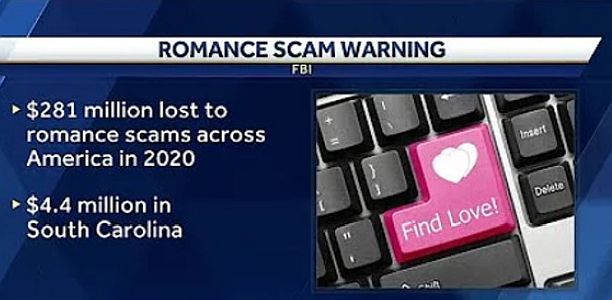
Valentine’s Day is coming: Beware of ‘romance scams’
(Cover photo: “FBI warns of romance scams ahead of Valentine’s Day,” Image credit: YouTube)
The FBI is warning the public all about bad actors using romance scams ahead of Valentine’s Day.
Romance scams occur when criminal actors deceive victims into believing they are engaging in a trusting relationship. They use that relationship to persuade victims to send money, provide personal and financial information, or purchase items for them.
In 2020, complaints filed with the FBI’s Internet Crime Complaint Center (IC3), showed that victims lost more than $281 million to romance scams. South Carolinians alone reported losses of more than $4.4 million that year. These schemes affect victims from all demographics, but elderly women are often targeted most.
The FBI offers these warning signs of the actors and their schemes:
- Immediate attempts to communicate by email or messaging services outside of a dating site
- Claims to be from the U.S. but is currently living or traveling abroad
- Claims that being introduced was “destiny” or “fate”
- Reports a sudden personal crisis and pressures you to provide financial help
- Disappears suddenly from a site, but reappears under a different name
- Asks for money, goods, or other types of financial assistance without having met in person
The best defense against romance scams is education and awareness. Below are some tips to help avoid becoming a victim:
- Never send money to someone you meet online, especially by wire transfer.
- Never give someone your banking or credit card information without verifying a recipient’s identity.
- Never share your Social Security Number or other personally identifiable information with someone who does not need to know the information.
- Be careful what you post and make public online. Scammers can use details shared on social media and dating sites to better understand and target you.
- Research the person’s photo and profile using online searches to see if the image, name, or details have been used elsewhere.
- Go slowly and ask the other person lots of questions.
If you believe you are a victim of a romance scam, the FBI recommends reporting the activity to the IC3 at www.ic3.gov. You should also contact your financial institution if you discover fraudulent or suspicious transactions. Finally, you should report the activity to the website or application where the contact first began.
(Source: FBI Columbia)
~ Posted by Richard Webster, Ace News Today / Connect with Richard on Facebook and Twitter






